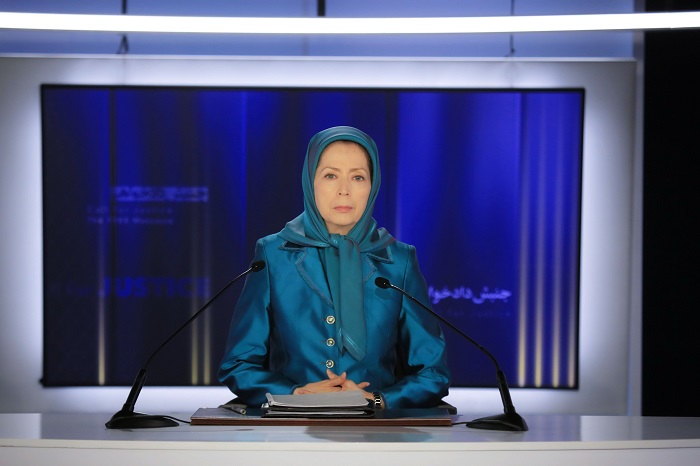
The National Council of Resistance of Iran (NCRI), and the People’s Mujahedin of Iran (PMOI / MEK Iran), reported that on the 30th anniversary of the 1988 massacre, more than 1,000 political prisoners and witnesses of torture in prisons and dungeons of the clerical regime demanded an end to the impunity enjoyed by the regime leaders.
30th anniversary of the 1988 massacre
30th anniversary of the 1988 massacre, more than 1,000 political prisoners and witnesses of torture in prisons and dungeons of the clerical regime demanded an end to the impunity enjoyed by the regime leaders and to prosecute Khamenei, Raisi, Judiciary Chief, Eje’i, and other perpetrators of the massacre.
1988 massacre, based on Khomeini’s fatwa, the clerical regime executed at least 30,000 political prisoners, more than 90% of whom were Mujahedin-e Khalq (MEK Iran / PMOI) activists. They were massacred for their steadfast commitment to MEK’s ideals and the Iranian people’s freedom.
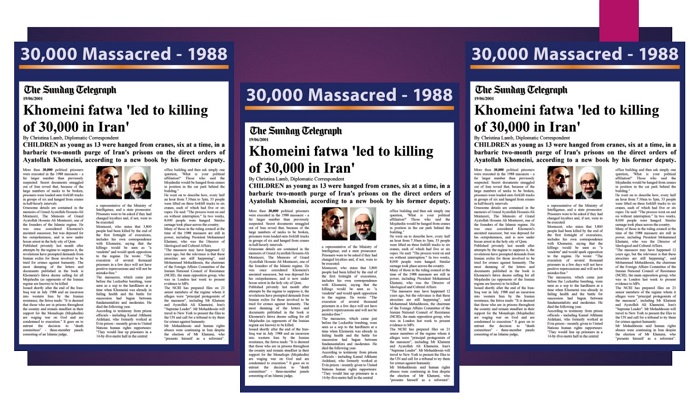
1,000 political prisoners in attendance at the conference
Mrs. Maryam Rajavi, the President-elect of the National Council of Resistance of Iran (NCRI), and hundreds of prominent political figures, as well as jurists and leading experts on human rights and international law from around the world, participated in the conference.
Maryam Rajavi referred to some 1,000 political prisoners in attendance at the conference, who had been tortured under the dictatorships of the mullahs and the Shah, a quarter of women, and underscored: The clerical regime wanted to break and defeat every member and supporter of the MEK by torturing, burning, and flogging. It tried all evil, malicious, and inhuman tactics.
They inflicted the most depraved tortures on the female MEK prisoners in the so-called “residential units.” They locked them in “cages” for weeks and months to break their spirit of resistance. Finally, in the summer of 1988, MEK members were offered a choice between death or submission coupled with renouncing their loyalty to the MEK.
The generation that stepped into this path inspired by Massoud Rajavi and longing for freedom resisted heroically in prisons, under torture, and in the harshest conditions. Even when they had to choose between surrender and execution, they courageously adhered to their principles: the overthrow of the clerical regime and the establishment of freedom for the people.
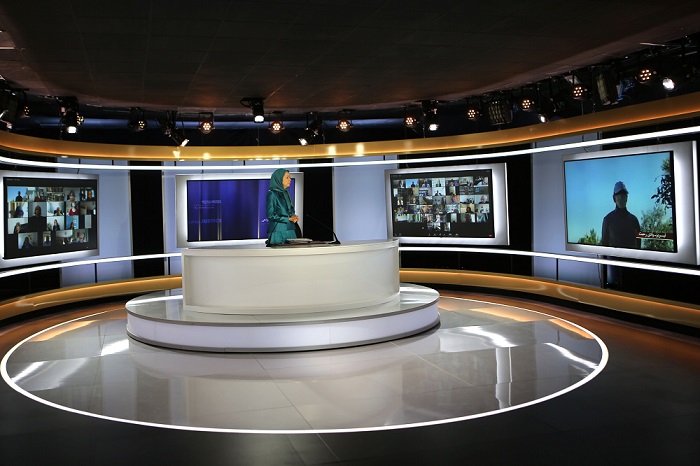
Remarks by, Geoffrey Robertson
In his remarks, Geoffrey Robertson, First President of the UN Special Court for Sierra Leone, said: “It has been a crime to kill prisoners for centuries. The difference is that if it amounts to a particular crime of genocide, there is an international convention that binds countries to take action and punish that genocide.”
Referring to Khomeini’s fatwa calling for the annihilation of the MEK and calling them Mohareb (enemies of God) and used by the regime as the basis of the massacre, he reiterated, “It seems to me that there is very strong evidence that this was a genocide. It applies to killing or torturing a certain group for their religious beliefs. A religious group that did not accept the backward ideology of the Iranian regime… There is no doubt that there is a case for prosecuting [regime President Ebrahim] Raisi and others.
There has been a crime committed that engages international responsibility. Something must be done about it as has been done against the perpetrators of the Srebrenica massacre.”
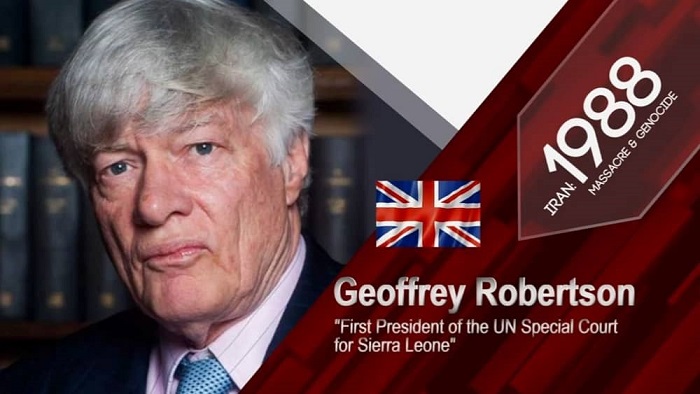
Remarks by, Kumi Naidoo
Kumi Naidoo, Secretary-General of Amnesty International (2018-2020), said, “The 1988 massacre was a brutal, bloodthirsty massacre, a genocide. It is moving for me to see the strength and courage of people who have been through so much and seen so much tragedy and endure these atrocities.
I’d like to pay tribute to all the MEK prisoners and applaud you… The EU and broader international community must take the lead on this issue. This government, led by Raisi, has even greater culpability on the issue of the 1988 massacre. Governments that behave like this must recognize that behavior is not so much a show of force as an admission of weakness.”
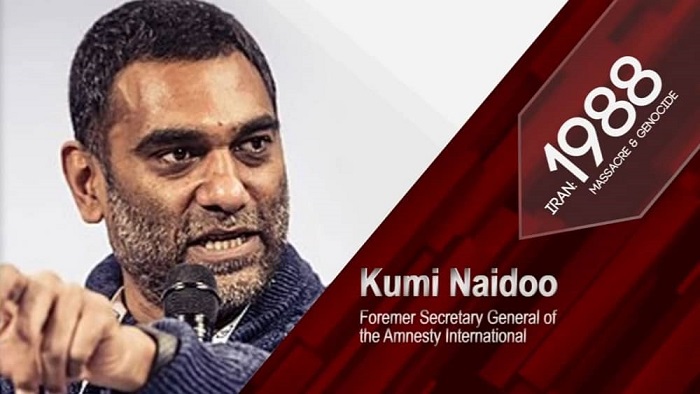
Remarks by, Eric David
Eric David, an expert on international humanitarian law, also confirmed the characterization of genocide and crimes against humanity for the 1988 massacre.
There is no doubt that this is a crime against humanity. It was an attack on a civil population. This is also a genocide because the victims were killed based on their adherence to a set of beliefs that was banned by the mullahs.
All international jurisdictions can try this crime. If a regime official is in any country, that country can easily accuse and try that person for his responsibility in the 1988 massacre. We have no difficulty judicially bringing this case to court.
We have to reiterate that these criminals be brought to justice in international courts.
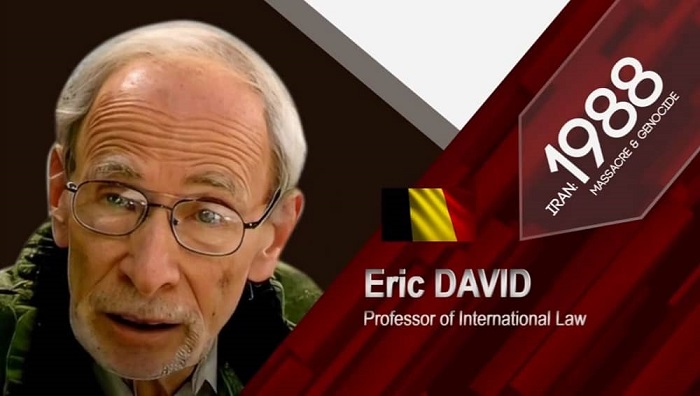
Remarks by, Franco Frattini
Franco Frattini, Foreign Minister of Italy (2002–2004 and 2008–2011) and European Commissioner for Justice, Freedom, and Security (2004–2008) said: “The actions of the new government of Iran are in line with the regime’s history. The new Foreign Minister has served under previous governments.
There is no difference between conservatives and reformists. It is the same regime. This is confirmed by the Foreign Minister’s closeness to the commander of the Quds Force. He even confirmed that he would continue the path of Qassem Soleimani.
Finally, I hope for an independent investigation with no limitation into the 1988 massacre. The credibility of the UN system is at stake. The UN Security Council has a moral duty. The UN owes this moral duty to innocent victims. Let us seek justice. Let us go forward with a serious international investigation.”
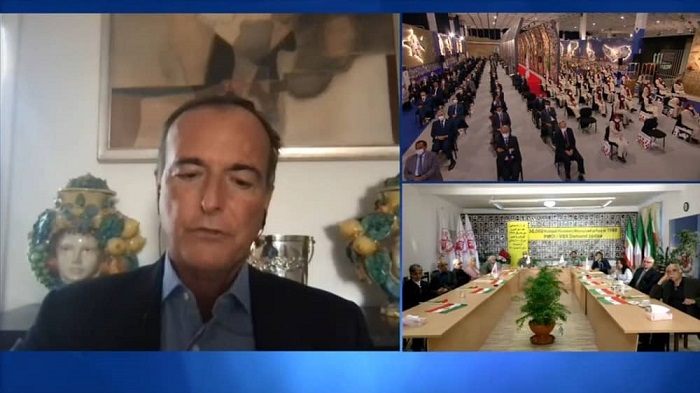
Remarks by, Guy Verhofstadt
Guy Verhofstadt, Prime Minister of Belgium (1999 to 2008), said: “I am still shocked by what happened in 1988.
The 1988 massacre targeted an entire generation of young people. It is crucial to know that this was planned in advance. It was planned and rigorously executed with a clear target in mind. It qualifies as genocide.
The massacre was never officially investigated by the UN, and the perpetrators were not indicted. They continue to enjoy impunity. Today, the regime is run by the killers of that time.”
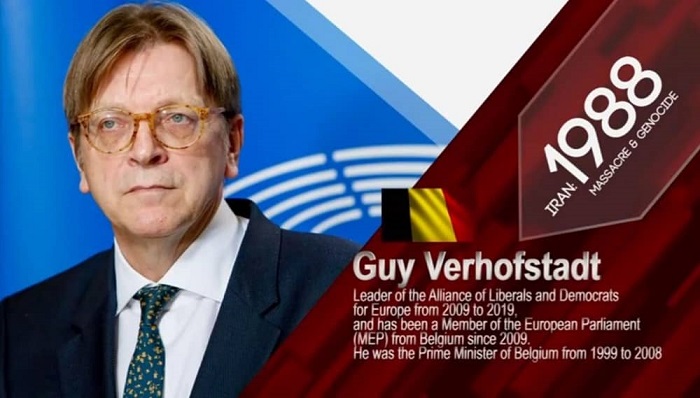
Remarks by, Giulio Terzi
Giulio Terzi, Foreign Minister of Italy (2011 to 2013), said: “Over 90 percent of those executed in the 1988 massacre were MEK members and supporters. The prisoners chose to stand tall by refusing to renounce their support for the MEK.
Many have called for an international investigation into the 1988 massacre. EU High Representative Josep Borrell should end his usual approach toward the Iranian regime. He should encourage all UN member states to demand accountability for Iran’s great crime against humanity. Thousands of people are out there who expect a more assertive approach by the international community, especially the EU.”
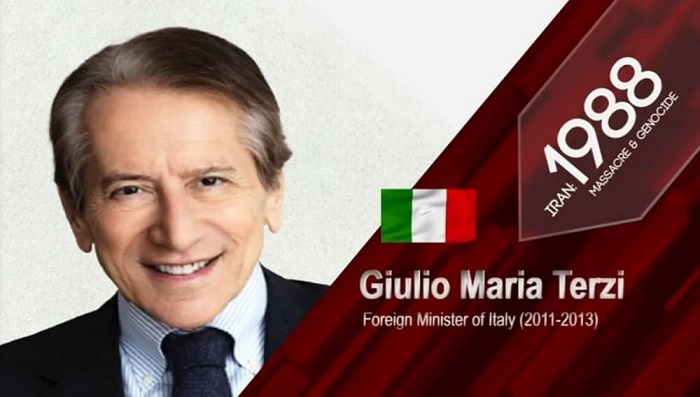
Remarks by, John Baird
John Baird, Canada’s Foreign Minister (2011-2015), also addressed the conference and condemned the 1988 massacre. He, too, called for an international investigation into this crime against humanity.
All it takes for evil to succeed in this world is for good people to do nothing. And that’s why it is so essential that we call it out for what it is and that we seek justice for those courageous people who gave their lives in the fight for a better Iran.
There is no doubt that the executions that took place in 1988 were purely based on a fatwa by the ayatollah targeting political prisoners, 90 percent of whom were affiliated with the MEK and now the NCRI.
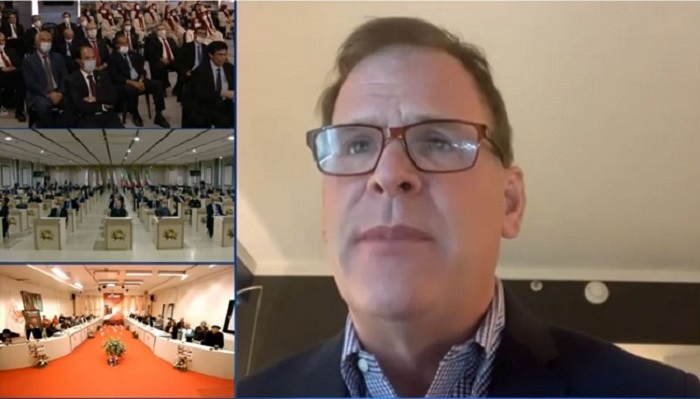
Remarks by, Audronius Ažubalis
Audronius Ažubalis, Minister of Foreign Affairs of Lithuania (2010 – 2012), underscored, “No one has yet faced justice for this crime against humanity.
There is no political will to hold the perpetrators to account. A UN investigation into the 1988 massacre is a must. The European Union has ignored these calls, shown no reaction, and not been prepared to show a reaction. I want to call on the EU to sanction the regime for crimes against humanity. I think Lithuania can take the lead among EU members.”
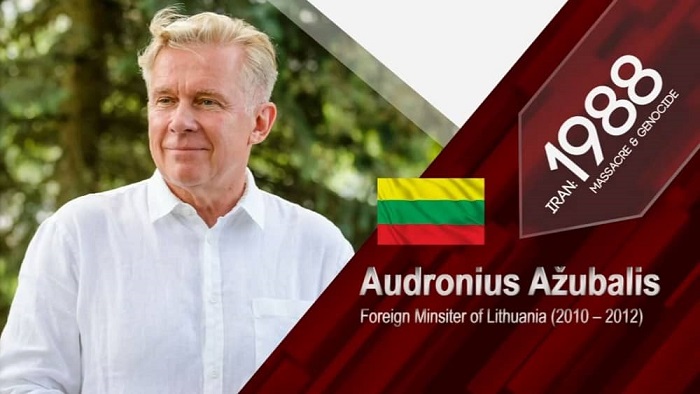
MEK Iran (follow us on Twitter and Facebook)
and People’s Mojahedin Organization of Iran – MEK IRAN – YouTube







